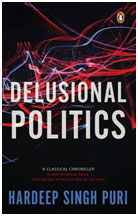Review of Delusional Politics (Book), by Hardeep Singh Puri. (2019, January 31) Penguin (304p) ISBN 9780670090259

Delusional Politics which is written by career diplomat Hardeep Singh Puri, as the name suggests, talks about decisions based on hubris judgements that often result in catastrophic consequences for the public at large. The book’s positon on Brexit and Trump’s election is informative and insightful. Puri is able to connect the dots of the Post-truth world with the advent of populism that has just arrived at the doorsteps of the global world. The book creates a timeline of those events that have been subjected to controversial decision making. It explained climate change and global governance thoroughly and repeatedly emphasised upon the role of Inter-governmental organization and NGOs.
Puri speaks richly of his experience and shares interesting anecdotes from time to time. He gives the readers a good idea about US’s negotiations with Iran and North Korea, which offers the readers a glimpse of the internal conflicts within the White House. The chapter on terrorism is specifically presented as it focuses more on the US. It talks about the problematic decisions the US government had taken and how most of the global world order decided to turn a blind eye towards it. Puri raises some interesting insights about questionable decisions undertaken by the UN like the military intervention in Libya which was given a go ahead by the UNSC. Puri gives us the basic definition of terror and shows the misunderstanding of how terrorist were earlier picturised. The concept and definition of terrorism has evolved. Puri uses this point to talk about how terror groups have forayed into cyber space and how counter terror operations are limited but are trying to work their way into Europe. While Puri’s main subject in this chapter was to talk about religion based terror activities he does dedicate a small article to the Liberation of Tamil Tigers Ealam (LTTE).
Puri’s chapter on India is restricted to delusional decision-making of the congress governments whether it is Indira Gandhi’s emergency, 1984 riots or Sonia Gandhi’s appointment of Dr Manmohan Singh. Puri plays it very safe with the BJP (as he himself is a minister in the party) by mentioning some issues within the current government like mob lynching, but he fails to highlight these issues in greater detail. Puri goes on to list the schemes and achievement of the Modi government and how it has benefited the Indian public. This is where the author drifts away from his neutral stand as he fails to look at India’s foreign policy from a critical lens. Very little is written about Modi’s foreign policy too. Instead, the reader is shown graphic comparison between the vote share of the BJP and the Congress throughout the years. This is unnecessary as it deviates from the core principles of the book.
The chapter on trade policies does feel a bit odd as it talks about core economic agendas implemented by some countries. It gives a good understanding of the economic system in global governance whether it is GATT, WTO or other regional trade corridors. Global trade is being hampered by populism throughout the world with the US adopting a protectionist policy which is reflected through their imposition of tariffs. Such unilateral actions undermine global institutions and international law, and this is the delusional aspect of policy making when it comes to economic trade at the global level, all of which is mentioned by the author.
This book is meant for generalists as it doesn’t focus on one subject by large. It is able to give the readers an essential understanding about the current trends in the International political order. The author makes an excellent effort to explain why the global order is encountering these problems and was able to trace their beginnings. Those in the field of IR may pick this book to brush up their knowledge, but those who aren’t and have a slight interest in global politics then this book will prove to be a good guide.